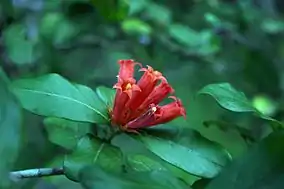| Burchellia bubalina | |
|---|---|
 | |
| Burchellia bubalina | |
| Scientific classification | |
| Kingdom: | Plantae |
| Clade: | Tracheophytes |
| Clade: | Angiosperms |
| Clade: | Eudicots |
| Clade: | Asterids |
| Order: | Gentianales |
| Family: | Rubiaceae |
| Genus: | Burchellia R.Br. |
| Species: | B. bubalina |
| Binomial name | |
| Burchellia bubalina | |
| Synonyms | |
|
Genus
Species
| |
Burchellia is a monotypic genus of flowering plants in the family Rubiaceae. The genus contains only one species, viz. Burchellia bubalina, which is endemic to southern Africa: the Cape Provinces, KwaZulu-Natal and the Northern Provinces in South Africa, and Eswatini.[2] It is commonly known as wild pomegranate (English) or wildegranaat (Afrikaans).[3]
Description
Burchellia bubalina is a small shrub or tree up to 8 metres tall. It has red flowers, grey-green bark and dark green leaves.[4] It occurs in forests, rocky outcrops or in grasslands.[5]
Uses
The species is widely cultivated in frost-free gardens as an ornamental tree and has become a weed in some regions.[6] The bark and root are used medicinally.[5]
Systematics
The name of the genus was given in honour of William John Burchell, an African explorer.
Taxonomy
The taxon was revised by John Sims in the species' first description in Curtis's Botanical Magazine in 1822.[7] He gives this account of the earlier taxonomic history:
In the Supplementum Plantarum of the younger Linnæus this plant was referred to the genus Lonicera, but as it belongs to the natural order of Rubiaceae it will by no means associate with that genus. Persoon joined it with Swartz's Cephælis, the Tapocomea of Jean Baptiste Christophore Fusée Aublet and Bernard de Jussieu; but Mr. Brown not finding it to accord with any established genus, has considered it as distinct from any, and given it the name of Burchellia in honour of Mr. Burchell, a very enterprising traveller in Southern Africa, who has favoured the public with an interesting account of his travels in that country. And, certainly, persons who, in spite of deprivations and difficulties, spend a large portion of their valuable time in such hazardous undertakings, for the promotion of science, merit this only reward of the botanist; but we can by no means approve of altering the specific name, which, when once established, should remain inviolate, except for very particular reasons; we have therefore thought it right to restore the name of bubalina.
Following the formal description, he wrote as follows:
Burchellia bubalina is a native of the Cape of Good Hope, where it is called Buffelhorn or Buffaloe-Horn, a name given it by the colonists from the extreme hardness of its wood. Flowers in the spring or summer. Requires to be protected from frost and we believe has seldom blossomed in this country without the assistance of the heat of the stove. Communicated by Messrs. Loddiges and Sons.
Gallery
 Close-up of the flowers
Close-up of the flowers
_Burchellia_bubalina.png.webp)
References
- ↑ Botanic Gardens Conservation International (BGCI); IUCN SSC Global Tree Specialist Group (2020). "Burchellia bubalina". IUCN Red List of Threatened Species. 2020: e.T146449514A146449516. doi:10.2305/IUCN.UK.2020-2.RLTS.T146449514A146449516.en. Retrieved 24 April 2023.
- ↑ "Burchellia bubalina". World Checklist of Selected Plant Families. Royal Botanic Gardens, Kew. Retrieved 2015-09-18.
- ↑ Dlamini MD (February 2005). "Burchellia bubalina (L.f.) Sims". PlantZAfrica.com. SANBI.
- ↑ Gibbs Russell, G. E., W. G. M. Welman, E. Retief, K. L. Immelman, G. Germishuizen, B. J. Pienaar, M. van Wyk & A. Nicholas. 1987. List of species of southern African plants. Memoirs of the Botanical Survey of South Africa 2(1–2): 1–152(pt. 1), 1–270(pt. 2).
- 1 2 van Wyk, Braam (1997). Field Guide to Trees of Southern Africa (1st ed.). Cape Town, South Africa: Struik Publishers. pp. 278–279. ISBN 1 86825 922 6.
- ↑ "Burchellia bubalina (Rubiaceae)". Global Compendium of Weeds. GCW and Hawaiian Ecosystems at Risk project.
- ↑ Sims, John. 1822. Botanical Magazine 49: t. 2339
